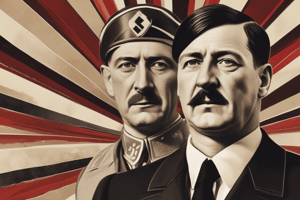Podcast
Questions and Answers
What is Mein Kampf?
What is Mein Kampf?
Mein Kampf is a novel written by Adolf Hitler when he was in prison that outlines his autobiography and political program.
What are the two volumes of Mein Kampf and what do each volume describe?
What are the two volumes of Mein Kampf and what do each volume describe?
Volume I describes Hitler's autobiography, his childhood, and WWI experiences; Volume II discusses the National Socialist Movement (Nazism) and his racial beliefs.
What do the first few chapters of Mein Kampf describe?
What do the first few chapters of Mein Kampf describe?
The first few chapters describe Hitler's childhood fascination with history and the hidden forces that shape historical events.
What is an example/quote that Hitler uses to describe his view of history?
What is an example/quote that Hitler uses to describe his view of history?
What was Hitler's view of WWI in contrast to the nation of Germany and the people that live and exist inside of that nation?
What was Hitler's view of WWI in contrast to the nation of Germany and the people that live and exist inside of that nation?
Why was WWI so important to Hitler?
Why was WWI so important to Hitler?
When and what happened that caused a turning point from Volume 1 to Volume 2?
When and what happened that caused a turning point from Volume 1 to Volume 2?
What is the main goal of the program of Mein Kampf and who are the two primary opponents or villains?
What is the main goal of the program of Mein Kampf and who are the two primary opponents or villains?
Flashcards are hidden until you start studying
Study Notes
Overview of Mein Kampf
- Written by Adolf Hitler during his imprisonment, serving as both an autobiography and a political manifesto.
- Combines personal history with broader historical context.
- Divided into two separate volumes, each addressing different themes.
Volume I: Autobiographical Insights
- Chronicles Hitler's early life, including family background and experiences in Vienna.
- Covers his time as a soldier in World War I, detailing the suffering and formative years that shaped his outlook.
Volume II: Political Ideology
- Focuses on the National Socialist Movement, outlining the principles of Nazism.
- Discusses Hitler's racial beliefs and the significance he placed on oratory skills in politics.
Early Chapters: Historical Perspective
- Highlights Hitler's childhood fascination with history, emphasizing the belief that hidden forces shape historical outcomes.
Quote on Historical Understanding
- Hitler asserts the importance of uncovering the causes behind historical events: "To learn history means to seek and find the forces which are the causes leading to those effects which we subsequently perceive as historical events."
World War I's Impact on Hitler
- Described as a moment when the German people envisioned their future, showcasing their potential and "genius" through the bravery of soldiers.
- Seen by Hitler as a pivotal event that enabled Germany to reclaim its identity.
Significance of World War I
- Considered an opportunity for Europe to rediscover its true self and for Germans to embrace their political destiny.
- Contributed to the maturation of Hitler's political views and aspirations.
Transition from Volume I to Volume II
- February 24, 1920 meeting marks a critical shift, resulting in the Nazi Party's 25 point program.
- Solidified Nazi ideological principles and laid the groundwork for future policies.
Goals and Adversaries of Mein Kampf
- Aims to establish a unified German state with a focus on a racially-based community.
- Primary enemies identified include Marxism and Jewish influence, seen as threats to the envisioned unity.
- Hitler refers to Marxist ideas as "deadly poison," attributing their spread to Jewish influence, portraying them as tools for domination.
Studying That Suits You
Use AI to generate personalized quizzes and flashcards to suit your learning preferences.




